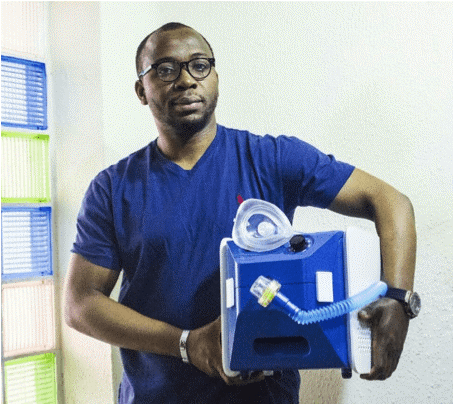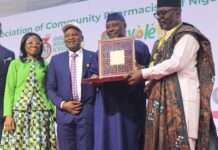About five to 15 per cent of patients with COVID-19 infection require intensive care surveillance and ventilator support. Ventilators, the machines used to pump oxygen into the lungs of critically ill patients experiencing breathing difficulties, are important because patients’ blood oxygen saturation level has to be maintained to offer them the best chance of survival.
However, this essential device is in short supply. Indeed, in Nigeria with a population of over 200 million people, there are fewer than a thousand ventilators available. According to GlobalData, a data and analytics company that specialises in medical transaction and clinical information, about 880,000 ventilators are required globally amid the COVID-19 pandemic.
However, in 2016, long before the COVID-19 outbreak, a young medical doctor named Dayo Olakulehin had already developed a locally made ventilator (D-Box) to give patients with respiratory failure a better chance of survival.

Dayo Olakulehin is a medical doctor, entrepreneur, inventor, founder and creative director at LigandCorp. He has dedicated his life and career to innovating medical solutions, especially for use in health facilities in developing nations.
Olakulehin, founded LigandCorp in Lagos, Nigeria, as a medtech startup to produce the “D-Box”- an innovative, battery powered, portable alternative to conventional ventilators. According to him, the inspiration for this solution came about eight years ago while undergoing his medical housemanship at Lagos University Teaching Hospital (LUTH). He had observed that many patients with respiratory failure requiring ventilator support were unable to access it for reasons of cost, availability, or unstable power supply. As a result health workers attending to these patients had to manually ventilate them using a CPR bag for hours and there were instances in which patients were ventilated for days, with health workers taking turns to keep those patients alive by manually compressing the CPR bag.
Olakulehin also had a personal experience while on duty in an emergency ward at LUTH. He worked tirelessly to keep a fine-year-old boy alive by manual ventilator support. At about 2 am after over four hours of manually compressing a CPR bag, he fell asleep, only to be awakened by the boy’s father.
These experiences led Olakulehin to develop the portable ventilator called D-Box. The D-box is a device, about the size of a microwave oven, which automates the process of compressing a CPR (Cardio Pulmonary Resuscitation) bag. Essentially an automatic ventilator, it eliminates the need for manual work (human effort) in compressing the bag. It comes with a rechargeable battery, is portable and obviously designed with developing economies in mind.
The D-Box is different because it is less sophisticated and less complex than regular ventilators. It is portable, cheaper, and easier to handle. While the big teaching hospitals have five to six units of ventilators that are electricity-dependent and sensitive, the D-box can work on battery power for 8-12 hours.
The D-Box, however, isn’t meant to replace standard ventilators which exist for critical intensive care. It is being introduced to improve the quality of care that is available to the patient.
Background and education
Dayo Olakulehin had his secondary education at the Command Day Secondary School Ikeja, Lagos, from 1997 to 2003. After graduating from secondary school, he proceeded to Chrisland College, Lagos from 2004 to 2005, where he received his University of Cambridge Local Examination Syndicate Advanced Level Certificate and was the best graduating student.
In, 2006 Olakunlehin gained admission to study Medicine and Surgery at the College of Medicine, University of Lagos. He graduated with a Bachelor of Medicine and Surgery (MBBS) degree in 2011. After graduation, Olakuleyin proceeded for his medical housemanship at LUTH in 2012. He was mobilised for his national youth service in March 2013 and served as a resident medical officer at CMC, Randle Road. After his youth service, he moved to Lagoon Hospitals where he worked at the JCI (Joint Commission International) accredited health facility as a medical officer.
After about three years of nurturing his idea of the D-Box portable ventilator, he decided to make it a reality. Since he was trained as a general physician, he did not know much about business, patenting or developing innovations. This led him to enroll for his master’s degree in Innovation and Entrepreneurship at the MacMaster University from 2016 to 2018.
It was within this period that he met with Mr. Kunle Soriyan and Thelma Ekiyor of Afrigrants. They were able to connect with Olakulehin’s vision and decided to partner with him. This led to the founding of LigandCorp, a healthcare innovation and medical device company. Thus, Olakunlehin’s shifted his paradigm from focusing on one product idea to creating a company that drives medical innovation.
After the formation of LigandCorp, the search for a prototype developer began and while in Canada pursuing his master’s degree, a collaboration was formed with Inertia, an engineering and design company, who committed to partnering with LigandCorp and worked hard to get the prototype ready.
Inertia Engineering has a proven track record of building specialised products, such as ergonomic seats, aeronautical landing gear, docking stations etc. The partnership saw the Canadian firm build Dayo’s idea in what the firm regards as “record time”. In three months, a proof of concept prototype was ready.
In a period where COVID-19 pandemic is ravaging the global health system, Dr Olakuleyin’s innovative medical device could potentially save millions of lives worldwide, particularly in resource-limited health facilities common in developing countries.
Olakulehin’s ultimate goal is to put at least one D-Box on every emergency tray in the world, from sick bays, to company clinics, to public spaces, to health facilities, to military camps, and everywhere else. The fact that it’s the cheapest ventilator available in the market (its introductory price is pegged at $300) makes this vision all the more possible.













